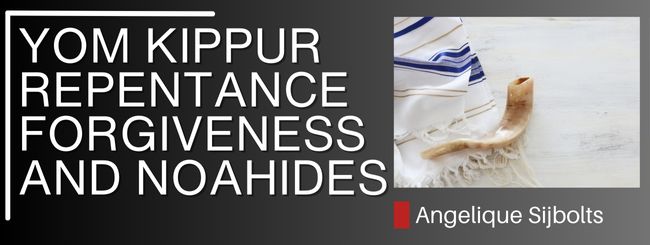בס”ד
There are some Jewish holidays that include aspects with universal significance. Noahides are obligated not to observe any of the Jewish holidays as religious obligations, but they are permitted to do some related activities on those days, in recognition of their significance.
One of the holidays is Rosh HaShanah because we read in Mishna Rosh HaShanah 1:2
At four times of the year the world is judged: On Passover judgment is passed concerning grain; on Shavuot concerning fruits that grow on a tree; on Rosh HaShana, all creatures pass before Him like sheep [benei maron], as it is stated: “He Who fashions their hearts alike, Who considers all their deeds” (Psalms 33:15); and on the festival of Sukkot they are judged concerning water, i.e., the rainfall of the coming year.
Rosh HaShanah, not Yom Kippur, is the annual day of over-all judgment for non-Jews. Yom Kippur is not mentioned in the preceding passage.
The question therefore becomes, what makes Yom Kippur so uniquely Jewish that Noahides may not observe its rituals? After all, isn’t it all about repentance? Noahides, too, wish to make amends with the Eternal.
First, let’s define Yom Kippur.
We can deduce this from the date. Yom Kippur is observed on the 10th of Tishrei. Moses descended from Mount Sinai on this day with the second set of stone tablets upon which G-d had inscribed the Ten Commandments that He spoke to the Jews in the revelation at Mount Sinai. Receiving the second set revealed to the Jewish people that the Eternal had forgiven them… For what?… for the sin of making the golden calf.
Moses ascended Mount Sinai to receive the first set of stone Tablets. However, it took longer than the people expected for Moses to return. People grew agitated and fearful. They wanted a successor for Moses, through wich G-d would lead them in place of Moses.
The people wanted to be led by G-d through an entity which, like Moses, would have no independent will of its own, so they demanded to have this in the form of an inanimate statue. Then, after the golden calf was formed, the Erev Rav [a mixed throng (erev rav) of Egyptians and people of other nationalities, who were insincere converts that marched out of Egypt with the Jewish people] convinced a small percentage of the Jews that it should now be their new god.
Making the golden calf to be their intermediary (a sheetuf), in violation of G-d’s words in the Ten Commandments, was what the Jews repented of after Mose broke the first tablets, and it was this sin that G-d forgave on that first Yom Kippur. In honor of that occurrence, every year on that day, atonement is especially given to Jews for acts repented of (whether intentional, inadvertent, or unknown), as we read in Leviticus 16:29-30:
And this shall be to you [the Jewish people] a law for all time: In the seventh month, on the tenth day of the month, you shall practice self-denial; and you shall do no manner of work, neither the native Israelite nor the convert who resides among you. For on this day, atonement shall be made for you to purify you of all your sins; you shall be pure before the L-rd.
The significance of Yom Kippur for Noahides and nations is that we can learn about repentance from it and realize that we should not make intermediaries for ourselves between us and G-d, nor trust anybody or anything other than the Eternal.
Repentance for our sins against G-d and repentance for our sins against other people (including righting the wrong done and asking for pardon) can be done at any time of year, including Yom Kippur.
If the approaching Yom Kippur provides an individual Noahide with additional inspiration and motivation to repent for all his sins, including doing so on that day, it is a good thing. But the forgiveness he will receive will be the consequence of his repentance, just like on any other day, and not because it is Yom Kippur.
On Yom Kippur, a Noahide is not permitted to fast (even partially), because that is the ritual Jewish commandment for the day. But, as previously stated, it is a positive thing when a Noahide gets inspired by Yom Kippur to confess his sins and repent. On this day, it is a good idea to correct mistakes, ask forgiveness from those whom you have offended, donate charity, do deeds of goodness and kindness, pray, and so on.
G-d is forgiving and He forgives those who repent, confess, ask Him for forgiveness:
Moreover, if someone wicked repents of all the sins that were committed and keeps all My laws and does what is just and right, they shall live; they shall not die. None of the transgressions they committed shall be remembered against them; because of the righteousness they have practiced, they shall live. (Ezekiel 18:21-22)
G-d accomplishes this every day, and He brings atonement to repentant Jews, especially on Yom Kippur.
Jews read the book of Jonah on Yom Kippur, which describes how the non-Jewish inhabitants of Nineveh repented and were forgiven by G-d. However, when the people of Nineveh repented and G-d forgiven them, it did not take place on Yom Kippur. Jonah received the prophecy to go to Nineveh and warn the people during Sukkot.
And this brings us to Sukkot, which you can read more about in another blog.
By Angelique Sijbolts
Sources:
Texts: Sefaria.org
Thanks to Dr Michael Schulman for his feedback and input
© Copyright, all rights reserved. If you enjoyed this article, we encourage you to distribute it further.
Our blogs may contain texts/ quotes or references of
Mechon-Mamre.org, Aish.com, Sefaria.org or AskNoah.org
that contain copyrights and which we may use with there permission..
